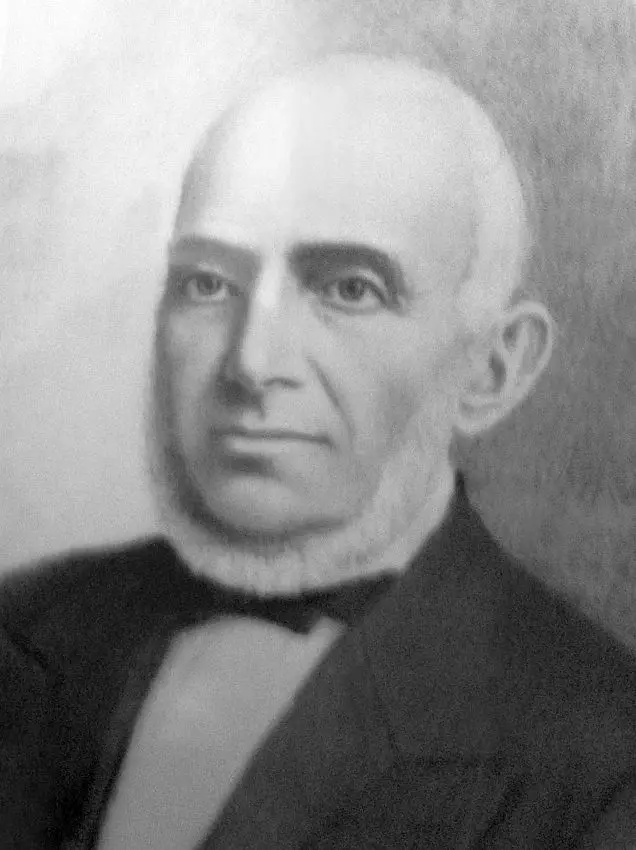Samuel Hirsch
(1815 – 1889)

Samuel Hirsch was a rabbi, philosopher of Judaism, and pioneer of the Reform movement in Germany and the United States. Samuel Hirsch belonged to the first generation of modern European rabbis who, combining traditional Jewish learning with university training, founded the Wissenschaft des Judentums (“science of Judaism”). He was born at Thalfang, Prussia, and served as rabbi in Dessau (1839–41), and as chief rabbi of Luxembourg (1843–66). He then emigrated to America, where he led the Reform congregation Keneseth Israel in Philadelphia until 1888. He spent the last year of his life in Chicago with his son Emil G. Hirsch, who was the leading Reform rabbi in the United States at the turn of the century.
In his major philosophic work, Die Religionsphilosophie der Juden (1842), Hirsch interpreted Judaism as a dialectically evolving religious system. In the manner of the contemporary speculative idealism, which tended to comprehend all of reality under a single unifying concept, Hirsch’s system was based on man’s self-awareness. Conscious of his distinctive self, man comes to know the freedom of his sovereign will by which he alone among all creatures transcends the determinism of nature. This capacity for freedom is something “given” and implies a transcendent Source, “an Essence that bestows freedom upon him… This Essence he calls God” (Religions philosophie, 30). A critical disciple of Hegel, Hirsch rejects his philosophic master’s contention that Judaism holds a rank inferior to Christianity on the scale of religions. In Hirsch’s view, Judaism and Christianity are both equally valid. Judaism is “intensive” religiosity, a way of living with the true God who has entered Israel’s midst, while Christianity represents “extensive” religiosity, whose function is the proclamation of this God to the pagan world. Both religions are destined to become perfected as absolute religiosity in the messianic era when the Christians will complete the conversion of the pagans and the Jews will obey the true God freely, no longer by compulsion.
Hirsch opposed sporadic and unprincipled attempts at religious reform by radical lay groups, such as the Frankfurt Verein, who in 1843 disavowed the authority of the Talmud and belief in the Messiah. He was a leading participant at the rabbinic conferences of 1844–46 at Brunswick, Frankfurt, and Breslau, which formulated the basic positions of the Reform movement. Hirsch upheld the rite of circumcision and the use of Hebrew in public services; yet he was the first rabbi to advocate the transfer of the Sabbath to Sunday, which he actually carried out as rabbi of Keneseth Israel in Philadelphia. Though at first adopted by a number of communities, this innovation was gradually abandoned by nearly all American Reform congregations.
Hirsch was president of the first Conference of American Reform Rabbis, which convened in Philadelphia in 1869 and played a leading role in framing the so-called “Pittsburgh Platform“ (1885); this platform set the course of American Reform Judaism until the advent of the Hitler era. Hirsch founded the first American chapter of the Alliance Israélite Universelle and was a frequent contributor to Jewish journals. His other works include Messiaslehre der Juden in Kanzelvortraegen (1843), and the polemical Briefe zur Beleuchtung der Judenfrage von Bruno Butler (1843).
BIBLIOGRAPHY
D. Philipson, Reform Movement in Judaism (19673); Guttmann, Philosophies, 313–21; N. Rotenstreich, Jewish Philosophy in Modern Times (1968), 120–36; Katz, in: REJ, 75 (1967), 113–26; M. Kaplan, Greater Judaism in the Making (1960), 258–65. ADD. BIBLIOGRAPHY: E. Fackenheim, "Samuel Hirsch and Hegel: A Study of Hirsch's Religionsphilosophie der Juden (1842)," in: A. Altmann (ed.), Studies in Nineteenth Century Jewish Intellectual History (1964), 171–201; J. Reinharz and W. Schatzberg (eds.), "Reform Jewish Thinkers and Their German Intellectual Context," in: The Jewish Response to German Culture (1985).
Source: Encyclopaedia Judaica. © 2007 The Gale Group. All Rights Reserved.
Photo: Public Domain.


